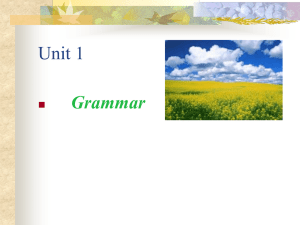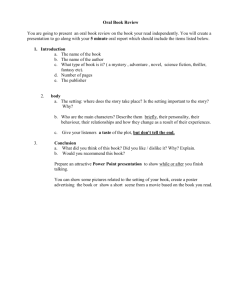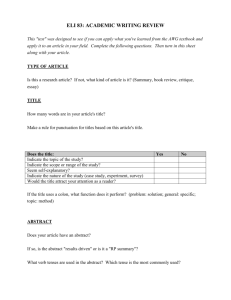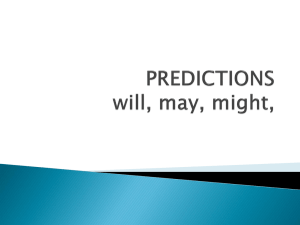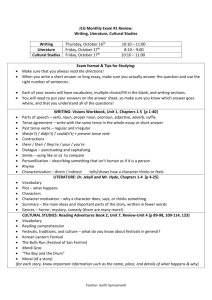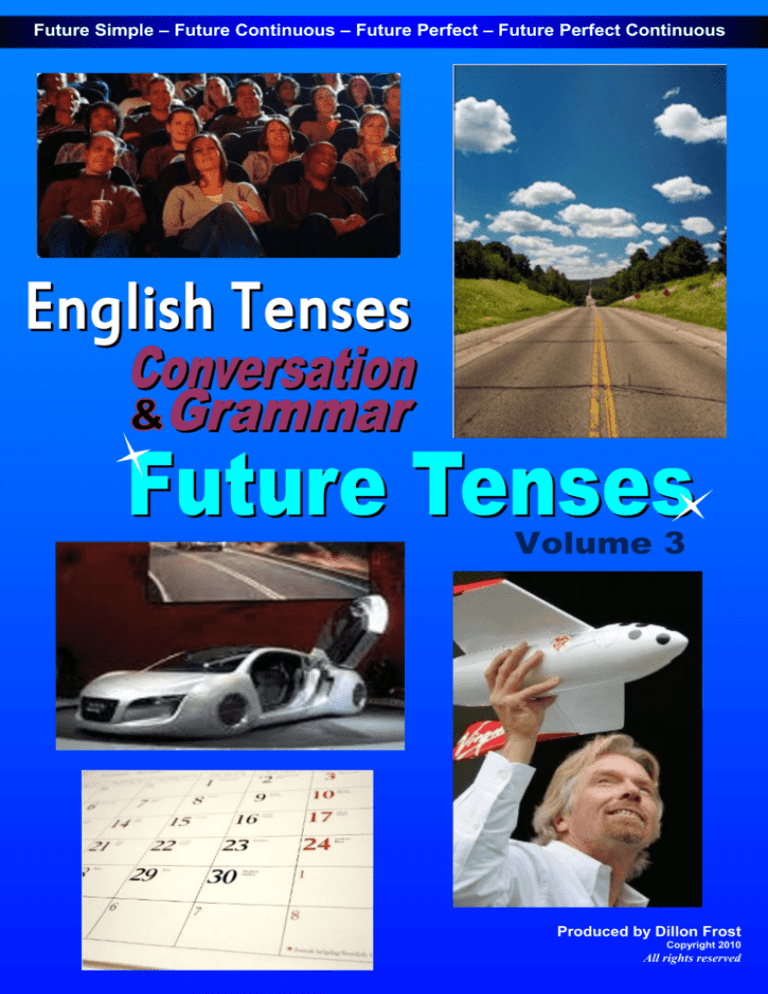
Future Simple – Future Continuous – Future Perfect – Future Perfect Continuous
Volume 3
Produced by Dillon Frost
Copyright 2010
All rights reserved
P age |2
Contents
Page 3
Time Tenses Log
Page 4
Future Simple Tense
Page 9
Future Continuous Tense
Page 14
Future Perfect Tense
Page 19
Future Perfect Continuous Tense
Page 23
Conclusion and next e-book
P age |3
Time Tenses Log
Print out and use this table to record examples of each tense.
Time Period
Tenses
Future Simple
Usage
Statement
Question
Answer
Statement
Future Continuous
Question
Future tense
Answer
Future Perfect
Statement
Question
Answer
Future Perfect Continuous
Statement
Question
Answer
Number
49.
50.
51.
52.
53.
54.
55.
56.
57.
58.
59.
60.
61.
62.
63.
64.
65.
66.
67.
68.
69.
70.
71.
72.
Examples
Type
Positive
Negative
Positive
Negative
Positive
Negative
Positive
49
50
51
52
53
54
55
Negative
Positive
Negative
Positive
Negative
Positive
Negative
Positive
Negative
Positive
Negative
Positive
Negative
Positive
Negative
Positive
Negative
56
57
58
59
60
61
62
63
64
65
66
67
68
69
70
71
72
P age |4
~ The Future SimpleTense ~
Past
Present
Future
Structure of sentence
Subject + will/shall + verb
[questions] will/shall + subject + verb
In English, the future simple tense is used for spontaneous decisions, an
assumption/promise or an action in the future that cannot be influenced.
Examples of future simple in use:
1. “Wait, I will help you” (a spontaneous decision)
2. He will probably come back tomorrow (an opinion, hope, uncertainty or assumption)
3. “I will not watch TV tonight” (a promise)
4. “It will rain tomorrow” (an action in the future that cannot be influenced)
Statement
–
Positive:
Negative:
I will go out tonight.
I will not walk to work on tomorrow (won’t)
Question
–
Positive:
Negative:
Will you help me?
Will she not speak tonight?
Answer
–
Positive:
Negative:
Yes, she will.
No he will not.
The future & “going to..”
Signal words for future simple
in a year, next …, tomorrow
I think, probably, perhaps
“Going to..” is a special type of future English tense.
It is not related to the Future Continuous tense.
Its use is to express a conclusion regarding the immediate future (using available evidence)
or an action in the near future that has already been planned or prepared.
I am going to study harder next year (a planned action for the near future)
The sky is very dark and cloudy. It’s going to rain (a conclusion regarding the
immediate future using available evidence)
I
am
you / we / they
are
he / she / it
is
going to......
P age |5
Future Simple
Exercise 1
Put the verbs into the correct form (future simple).
Jim asked a fortune teller about his future. Here is what she told him:
1. You (earn) ____________________ a lot of money.
2. You (travel) __________________________ around the world.
3. You (meet) _____________________________ lots of interesting people.
4. Everybody (adore) ____________________ you.
5. You (not / have) ____________________________ any problems.
6. Many people (serve) _______________________ you.
7. They (anticipate) ______________________________ your wishes.
8. There (not / be) ___________________________ anything left to wish for.
9. Everything (be) ______________________ perfect.
10. But all these things (happen / only) ________________________ if you marry me.
Exercise 2
Write some sentences down about which of these activities you think people will or won’t
do in the future? In how many years? Finish off with 2 ideas of your own.
Learn by computer at home instead of going to school
Eat food pills
Produce babies in a laboratory
Fly to Mars
Live on the Moon
I think that people
P age |6
Exercise 3. [Copy & laminate]
Students take a flashcard and form a complete sentence in a question form using future simple.
For example:
(you / ask / him)
“Will you ask him to come to my office?”
(you / ask / him) -------------?
(Jenny / lock / the door) ------?
(it / rain) ------------?
(the teacher / test / our
English) ------------?
(what / they / eat) ---------?
(when / she / be / back) ------?
(who / drive / us / into town) --------?
(where / we / meet) --------?
(when / I / be / famous) --------?
(what / you / do) -------?
P age |7
Exercise 4 – Student A worksheet
1) Read the situations to your partner and listen to his/her reaction.
1. THE HOUSE IS ON FIRE
2. I AM HUNGRY
3. IT IS HOT
4. IT IS COLD
5. I AM ILL
2) Now react to your partner’s words using Shall I … ? and one of the phrases below.
BRING YOU A GLASS OF JUICE / HELP YOU WITH IT
TRANSLATE IT FOR YOU / LEND YOU MINE / CARRY THEM FOR YOU
Exercise 4 – Student B worksheet
1) React to your partner’s words using Shall I … ? and one of the phrases below.
OPEN THE WINDOW / MAKE YOU A SANDWICH / CLOSE THE WINDOW
CALL FOR A DOCTOR / CALL THE FIRE BRIGADE
2) Read the situations to your partner and listen to his/her reaction.
1. I CAN’T DO MY HOMEWORK
2. I DON’T UNDERSTAND THE WORD
3. MY PEN DOESN’T WRITE
4. MY BAGS ARE TOO HEAVY.
5. I AM THIRSTY
Exercise 5
Students take it in turns to construct and read out a sentence using “going to...” in the
positive, negative and question forms.
For example: (he / reach / his goal) “He is going to reach his goal. He isn’t going to reach
his goal. Is he going to reach his goal?”
1. he / get up / early
2. they / do / their best
4. the boss / sign / the contract
5. we / plant / the tree / in the morning
6. we / explore / a new territory
8. she / copy / the chapter
3. you / learn / Irish
7. Janet / miss / the bus
9. the robber / rob / another bank
P age |8
Extra information
Write on the board these three sentences. Ask the student’s if they know what the difference is
between each sentence.
1. “I will swim tomorrow.”
2. “I am going to swim tomorrow.”
3. “I am going to go swimming tomorrow.”
Answers to future simple
Ex1.
1. will earn
2. will travel
3. will meet
4. will adore
5. will not have
6. will serve
7. will anticipate
8. will not be
9. will be
10. will only happen
Extra information answers
1. Future simple form (spontaneous decision or promise)
2. ‘Going to’ form (planned action for the near future)
3. ‘Going to’ form (planned action for the near future – the verb [swimming] is not a continuous verb, it is called a gerund).
P age |9
~ The Future Continuous Tense ~
Past
Present
Future
Structure
Subject + will + be + verb + ing
[questions] Will +subject + be + verb + ing
In English, the future continuous is used for actions in progress at a certain time in the
future. For planned actions and for asking questions about people’s plans.
Examples of future continuous in use:
I’ll be flying to London exactly this time tomorrow. (certain point in the future)
I’ll be talking to John in the evening, can you remind him please? (planned action)
Will you be using the computer tonight? (someone’s future plan)
Students vocally complete each sentence and write down different examples on their time
tense log form.
Statement
–
Positive:
Negative:
He will be shopping….
She will not be running….(won’t)
Question
–
Positive:
Negative:
Will they be eating...?
Will she not be gardening….?
Positive:
Negative:
Yes, she will...
No he will not…
Answer
–
Signal words for future simple
in a year, next …, tomorrow
I think, probably, perhaps
Exercise 1
Complete the sentences with the correct form of the verbs in brackets (future continuous).
1. Hopefully tomorrow, we __________________ (lie) on the beach all day.
2. What _______________________ (you do) in a year from now?
3. At this level you _______________________ (speak) Spanish fluently in a few months.
4. Before long, he ______________________ (ask) you for more money again.
5. Just wait. She _____________________ (not telephone) you every night.
6. This time tomorrow, _________________________ (they sit) on a train to Barcelona?
7. I _______________________ (not use) my computer in the evening so you can play on it.
8. __________________ (you study) for your test tonight? I’d like to study with you.
9. He _____________________ (not work) on this project next week. He’ll be off.
10. What class _____________________ (she teach) at 8 o’clock tomorrow?
P a g e | 10
Exercise 2 [Cut out and laminate]
Students select a card and read out the situation. Next they re-form the situation so that they can
get someone to do something for them or so they can do something for someone else. They do
this by turning it into a question by selecting one of the key words on the top of their card
Example card
KEY WORDS
drive / go / phone / read / see / use / write
You want your friend to take your library book back today.
“Will you be going to the library today?”
drive / go / phone / read / see / use / write
You want to have a look at your friend’s magazine tonight.
drive / go / phone / read / see / use / write
You want your friend to give a photo to Mary tomorrow.
drive / go / phone / read / see / use / write
You want your friend to give a message to his brother soon.
drive / go / phone / read / see / use / write
You want to use your friend’s computer this afternoon.
drive / go / phone / read / see / use / write
You want your friend to give you a lift to work tomorrow morning.
drive / go / phone / read / see / use / write
You want your friend to send your best wishes to Sam soon.
P a g e | 11
Exercise 3
Student A
Complete your diary by asking your partner questions using Future Continuous. Answer your partner’s questions using
Future Continuous. E.g., “What will you be doing on Monday at 12noon?” “I will be having dinner with Max.”
Monday
Tuesday
Wednesday
9am Hair dressers
8.30am
10am Clean the kitchen
12noon
11am Internet man / fix
computer
11.30am
2pm Pick up Jessie from
nursery
3.20pm Visit dentist
12.30pm
5.20pm
4.30pm
4.15 Take Mark to Cubs
Thursday
Friday
Saturday
7.45am
8am Pick up meat from
butchers
10.30
10.45am Meet school head
teacher
11.30am Watch Dr House
9.50am
12.15pm
12noon Drive to St Ive’s
4.45pm Spaghetti & meat balls
for tea
5pm
1.30pm
4.55pm Meet friends at
night club
Exercise 3
Student B
Complete your diary by asking your partner questions using Future Continuous. Answer your partner’s questions using
Future Continuous. E.g., “What will you be doing on Monday at 9am?” “I will be getting my hair cut at the hair
dressers.”
Monday
Tuesday
Wednesday
9am
8.30am Take kids to school
10am
12 noon Dinner with Max
11am
2pm
12.30pm Find new suit
11.30am Take car to
mechanic
4.30pm Early tea – theatre
night
4.15pm
Thursday
Friday
Saturday
7.45am Doctors appointment
8am
10.30pm Weekly shop.
10.45
9.50am Clean bathroom
11.30am
12.15pm Dinner with Kate
12noon
1.30pm World cup / pub!!
4.45pm
5pm Office party
3.20pm
5.20pm Meal at Joel’s
restaurant
4.55pm
11.
P a g e | 12
Exercise 4
Think of and write down 4 questions to ask your partner about what they will actually be doing in
the future. Use the given time frames and use future continuous tense within your questions.
Some possible questions: “What will you be doing at 7pm tonight?” “Tonight, will you be watching T.V?”
“What will you be planning….?” “Do you think you will be …….ing tonight?”
1. (tonight)
2. (tomorrow)
3. (next week)
4. (next month)
Next, write down your partners answers using future continuous.
Example: “Mark said that he will be washing his car at 7pm tonight.”
1.
2.
3.
4.
P a g e | 13
Answers to future continuous
Ex1
1. Hopefully tomorrow, we will be lying on the beach all day.
2. What will you be doing in a year from now?
3. At this level you will be speaking Spanish fluently in a question of months.
4. Before long, he will be asking you for more money again.
5. Just wait. She won’t be telephoning you every night.
6. This time tomorrow, will they be sitting on a train to Barcelona?
7. I won’t be using my computer in the evening so you can play on it.
8. Will you be studying for your test tonight? I’d like to study with you.
9. He won’t be working on this project next week. He’ll be off.
10. What class will she be teaching a 8 o’clock tomorrow?
P a g e | 14
~ The Future Perfect Tense ~
Past
Present
Future
Structure
Subject + will + have + verb + ed (or) Past Participle form of the verb
[questions] Will + subject + have + verb + ed (or) Past Participle form of the verb
The future perfect tense is used for an action that will be finished before a stated future
time. In other words; it is used when you talk about the past in the future.
Examples of present perfect in use:
I will have finished by 10am.
I will have sung by this time tomorrow.
Signal words for future perfect
By Monday, in a week.
Tip = the word “shall” can be used instead of “will” especially for “I” and “we”.
Statement
–
Positive:
Negative:
They will have run... (they’ll)
He will not have worked... (he’ll)
Question
–
Positive:
Negative:
Will she have seen...?
Will I not have watched....? (won’t...?)
Answer
–
Positive:
Negative:
Yes, he will have....
No, I will not have... (won’t...)
Future Perfect
Exercise 1
Put the verbs into the correct form (future perfect).
1. By 9 o'clock we (cook) _______________________ dinner.
2. They (eat) _________________________ by then.
3. In one week he (cross) _______________________________ the Atlantic by boat.
4. She (go) _________________________ home.
5. Jane (not / finish) _____________________________ her work.
6. The sun (not / rise) _______________________________ by 4 o'clock.
7. (do / you) ________________________________ the washing up by six o'clock?
8. Our boss (not / leave) _______________________________ the office yet.
P a g e | 15
Exercise 2
Read the short story about Fred and underline all of the future perfect tenses in it.
By the end of this year Fred will have been a dentist for two years. He will have
had two thousand patients and he will have earned $25 000. He will probably
have bought another car. He won’t have moved to another house and he won’t
have got married. Will he have met an interesting girl? Will she have fallen in
love with him?
Exercise 3
Student A
Form the questions by using future perfect and ask them to your partner.
1. How many new words you / learn by the end of the week?
2. How many crossroads you / pass before you get home?
3. you / read any books by the end of the month?
4. What places you / visit by this time next year?
5. How many new buildings / be built in your city by 2021?
6. you / do any computer lessons / by next
Briefly write down your partner’s answers to your questions below.
1. ………………………………………………………………………………………………………
2. ………………………………………………………………………………………………………
3. ………………………………………………………………………………………………………
4. ………………………………………………………………………………………………………
5. ………………………………………………………………………………………………………
6. ………………………………………………………………………………………………………
Exercise 4
Mary is 18 now. Read how she sees her future.
As a class, answer the questions in the box.
This year I will go to university.
In 5 years I will finish my studies and find a good job.
In 7 years I will get married.
In 10 years I will have my first baby and I will be on
maternity leave to take care of him / her
In 11 years I will have my second baby.
In 13 years I will go back to work.
In 20 years I will start my own company.
In 30 -31 years my children will start studying.
In 35 years I will retire and move with my husband to
the country and my children will have their own
families.
In 38 years my first grandchild will be born.
What will have happened to Mary:
1. by the end of this year ?
2. by the time she is 27 ?
3. by the time she is 35 ?
4. by the time she is 50 ?
5. by the time she is 60 ?
P a g e | 16
Exercise 2
Read the short story about Fred and underline all of the future perfect tenses in it.
By the end of this year Fred will have been a dentist for two years. He will have
had two thousand patients and he will have earned $25 000. He will probably
have bought another car. He won’t have moved to another house and he won’t
have got married. Will he have met an interesting girl? Will she have fallen in
love with him?
Exercise 3
Student B
Form the questions by using future perfect and ask them to your partner.
1. you / change / your job by this time next year?
2. How many English lessons / you / attend by the end of this month?
3. How many exercises we / do by the end of the lesson?
4. How much money you / spend by the end of the week?
5. How many new underground stations / be built in Warsaw by 2018?
6. How many films you / see at the cinema by next year?
Briefly write down your partner’s answers to your questions below.
1) ………………………………………………………………………………………………………
2) ………………………………………………………………………………………………………
3) ………………………………………………………………………………………………………
4) ………………………………………………………………………………………………………
5) ………………………………………………………………………………………………………
6) ………………………………………………………………………………………………………
Exercise 4
Mary is 18 now. Read how she sees her future.
As a group, answer the questions in the box.
This year I will go to university.
In 5 years I will finish my studies and find a good job.
In 7 years I will get married.
In 10 years I will have my first baby and I will be on
maternity leave to take care of him / her
In 11 years I will have my second baby.
In 13 years I will go back to work.
In 20 years I will start my own company.
In 30 -31 years my children will start studying.
In 35 years I will retire and move with my husband to
the country and my children will have their own
families.
In 38 years my first grandchild will be born.
What will have happened to Mary:
1. by the end of this year ?
2. by the time she is 27?
3. by the time she is 35 ?
4. by the time she is 50 ?
5. by the time she is 60 ?
P a g e | 17
Exercise 5 [Cut out and laminate]
Students select a card and decide whether the statement will or will not happen in the
future. Then they read out the sentence completing it in Future Perfect.
Example: “Computers will have/will not have become more powerful than human intelligence.”
Computers _________ (become) more powerful than human intelligence.
People _________ (colonise) the solar system by the year 2050.
People __________ (land) on Mars by 2020.
The first human being ________ (be) cloned by the year 2075.
Scientist’s _________ (find) the cure for AIDS and Cancer within the
next 30 years.
Traditional farms __________ (disappear) very soon.
Astronauts ___________ (discover) many new galaxies and alien life by
2080.
Many species of plants and animals ________ (die out) before the year
2025.
People __________ (stop) using money in the near future.
P a g e | 18
Answers to future perfect
Ex1
By 9 o'clock we will have cooked dinner.
They will have eaten by then.
In one week he will have crossed the Atlantic by boat.
She will have gone home.
Jane will not have finished her work.
The sun will not have risen by 4 o'clock.
Will you have done the washing up by six o'clock?
Our boss will not have left the office yet.
P a g e | 19
~ The Future Perfect Continuous Tense ~
Past
Present
Future
Structure
Subject + will + have + been + verb + ing
The future perfect continuous tense is used emphasise the duration of an action up to a certain time
in the future. It can also be used to express an assumption regarding a future action. This tense is not
used as much as the other tenses.
Examples of future perfect continuous in use:
By the end of next month, she will have been teaching for twenty years.
This shop will have been trading for 5 years by this time next year.
Students vocally complete each sentence and write down different examples on their time
tense log form.
Statement
–
Positive:
Negative:
He will have been sleeping....
You will not have been sitting... (won’t)
Question
–
Positive:
Negative:
Will you have been cooking...?
Will you not have been climbing.....?
Answer
–
Positive:
Negative:
Yes, he will...
No they will not….
Signal words for future perfect continuous
for ..., the last couple of hours, all day long
Exercise 1.
Put the verbs in brackets into the correct form (future perfect continuous).
1) By the end of the week I (work) _________________________ here for four months.
2) By the end of this month we (live) _________________________ together for six years.
3) By the end of the term she (study) _____________________________ for nine years.
4) By midnight we (play) ________________________ this computer game for 48 hours.
5) She (talk) __________________________ on the phone for the last couple of hours.
6) They (look for) _________________________ me all night long.
7) He (play) ____________________________ soccer all day long.
8) You (watch) _______________________TV all the time.
9) He (not / sleep) ___________________________ all morning.
10) (wait / they) ____________________________ for 2 hours?
P a g e | 20
Exercise 2. [Cut out and laminate]
Student’s take a card and read it out selecting the correct missing word.
I................. living here for two months in May.
a. will have
b. will live
c. will have been
He............... writing the task.
a. will not have been
b. will have not been
c. willn't have been
In September I will have been learning English..............
a. since five years
b. for five years
c. five years
..............you come home; I will have been writing the task for two hours.
a. by
b. when
c. by the time
I will have been ............ with her by the time you come.
a. talk b. talking
c. talks
She................. for only four hours when we come back home.
a. will have been sleeping
b. will been sleeping
c. will have sleeping
She ......................... for two hours by the time she................
a. will have been driving/will arrive
b. will have been driving/arrive
c. will have been driving/arrives
..................... I will have been studying English for three hours.
a. Tomorrow
b. Tomorrow at this time
c. Tomorrow this time
We .................................watching TV when you ...................for help.
a. will have not been/call
b. will not have been/call
c. will not have been/will call
P a g e | 21
The Future for you!
Exercise 3
Student A
Ask your partner the following questions and record their answers on the back of this paper.
i.
Can you tell me some things that you will have been doing by this time next week?
ii.
Do you think that a woman will have been running the country of America as President by
the year 2020?
iii.
What is the likely hood that humans will have been communicating with alien life forms in 5
years time?
iv.
Is it true that we will have been visiting the moon for our holidays for ten years in the year
2040?
v.
Will you have been learning English for longer than me by this time next year?
Think of one question that you can ask any student in the classroom using future perfect
continuous. Ask them your question and record their answer below.
My question:
Their answer:
The Future for you!
Exercise 3
Student B worksheet
Ask your partner the following questions and record their answers below.
i.
What will you have been doing 8pm tonight?
ii.
Do you think that people will have been living in underwater cities by the year 2040?
iii.
What do you think the living conditions will have been like for people after world war 3, if it
ever happens?
iv.
Which animal do you reckon will have been the dominant species after man has left the
planet and then comes back to find out?
v.
What other lessons will you have been learning by this time next year?
Think of one question that you can ask any student in the class room using future perfect
continuous. Ask them your question and record their answer below.
My question:
Their answer:
P a g e | 22
Answers
Ex 1.
1) By the end of the week I will have been working here for four months.
2) By the end of this month we will have been living together for six years.
3) By the end of the term she will have been studying nine years.
4) By midnight we will have been playing this computer game for 48 hours.
5) She will have been talking on the phone for the last couple of hours.
6) They will have been looking for me all night long.
7) He will have been playing soccer all day long.
8) You will have been watching TV all the time.
9) He will not have been sleeping all morning.
10) Will they have been waiting for 2 hours?
P a g e | 23
Conclusions and further e-books
That completes the future tenses, and it is also completes the last tenses e-book in this set of
three volumes.
I hope that you find the exercises useful. I have tried to keep the tense explanations as simple
as possible and the pictures minimal to reduce file size and to save on printing. Also I have kept
the pictures black and white so as to maximise the visible image when you photocopy stuff.
As I’ve just said I have tried to keep the explanations simple because this set is aimed at new
teachers and people brushing up on their knowledge – however, just like all things in life; the
more you “look into” and “study” a particular subject the more complicated it can get. This is
very true when it comes to learning the English tenses. In other words…..you have only just
scratched the surface so don’t stop learning!
Bonus Book – MIXED TENSES!
This free bonus e-book compares the differences between the past, present & future tenses
through a series of conversational, grammatical and written exercises. The aim of which is to
“kick home” the ideas behind the use of English tenses in a fun way.
A Special Thanks
This volume set of e-books would not have been possible without the help of the following
people:
Ola – Poland (setting the standards in English grammar rules)
Carol – Germany (proof-reading. Your help is most appreciated)
My students – (also called “The Guinea pigs”)
Thank you and happy teaching!
Dillon Frost
www.englishactive.pl


